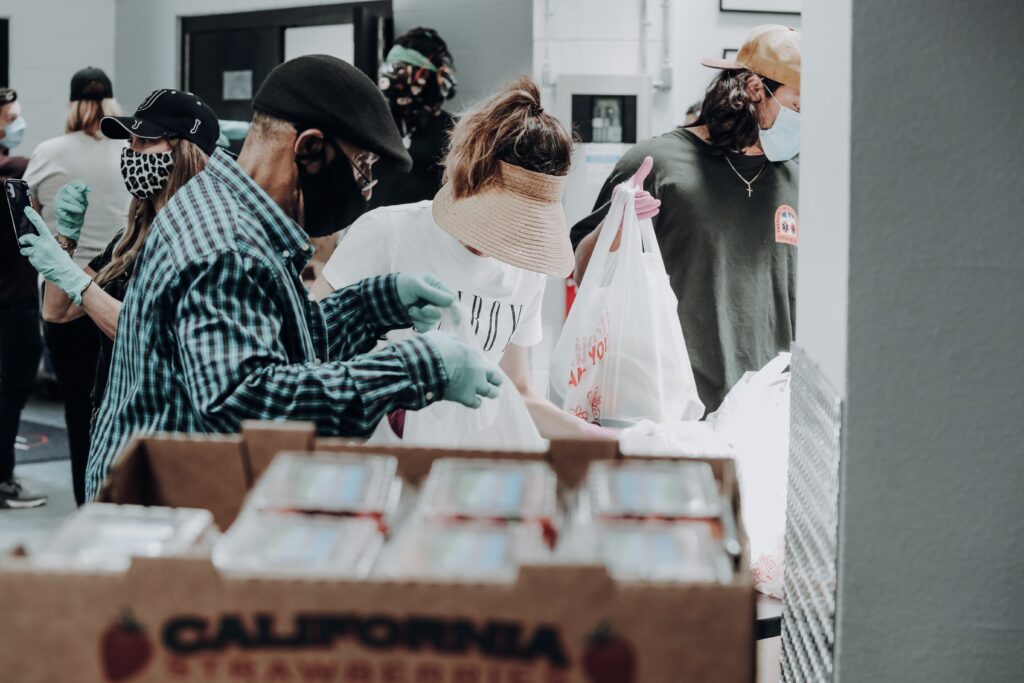Adapting Mercy Ministry in a Pandemic
The key word for 2020-21 is adapt. Everyone, from business to education to churches have had to adapt what they do to keep going during the COVID pandemic. And that is much more than posting a sign on your front door telling people masks are required to enter.
Adapt is the dominant word for churches
Churches have had to adapt how they worship—in-person or not, how many people, live streaming for the first time—how they provide religious education, how they do committee meetings (Don’t you wish you had bought stock in Zoom in 2019!), etc. Mercy ministry has suffered during the pandemic because of restrictions on gathering as well as fear of simply being with others. Some have adapted while others are waiting until the pandemic is over to resume ministry to people in need. The unfortunate reality is this is a double whammy–there are many more people in need now than prior to the pandemic but fewer churches are engaged in serving them.
I was interim pastor in a Baptist church in my town until recently. That church has several excellent, hands-on compassion ministries but the pandemic has changed how they do them if at all. One is providing temporary housing for homeless families in partnership with Family Promise. During COVID the church has suspended this ministry because of gathering restrictions at Family Promise’s request. Another is Food Coop, food distribution to about 20 families every other week in which the families are required to help out. Food is still being distributed but recipients can no longer enter the building to participate in a time of sharing and devotion because of the pandemic.
From adaptation to new life
Some of the surprises of COVID are the new opportunities that have come about. Ask Zoom about that! Some churches have lamented the loss of long-time ministries only to discover new ones as a result of the pandemic. The church where I was Interim broadcasts their Sunday worship via local television. During the pandemic their viewership skyrocketed as many people could not attend their own church.
Souper Bowl of Caring is one ministry that has found new life as a result of the pandemic. It began humbly in 1990 when a Presbyterian minister, Brad Smith, in Columbia, South Carolina challenged his congregation to place a dollar into a football helmet on their way out of church on Super Bowl Sunday. He said all the money given would be given to local food pantries to feed hungry people. To see a video of Brad Smith talking about this unique approach to hunger relief, click here.
Alison Reese, Executive Director of Souper Bowl of Caring, says the movement grew for years with hundreds of churches participating in the unique fundraising effort but in recent years they struggled. Their Board of Directors talked about closing the organization. Then COVID came and with it a new and much more daunting challenge for their mission, again a double whammy—more hungry people! According to McKinsey the need for food has increased by 60%, but at the same time it will be harder to raise money to help feed hungry people. If people aren’t able to attend church, you can’t expect much money to be given on Super Bowl Sunday. In the summer of 2019, the future was not promising for SBoC.
Then the Department of Defense called asking if SBoC could help them distribute FEMA resources, particularly food to people and organizations needing it (which gives new meaning to the saying “I’m from the government and I’m here to help you!”). They said Feeding America, the largest hunger relief organization in the U.S, couldn’t help them. With some funding help from the DoD, SBoC developed the Tackling Hunger Map, a database of 12,000 food charities across the U.S. With this database, a church or an individual wanting to locate a food charity close by can do so through the Tackling Hunger Map. Furthermore, each food charity can login to the site and post their real time needs. Anyone can donate to any food charity using the site. SBoC simply receives the donations and writes local charities a check each month. The food charity gets information about donors and thanks them.
From crisis to opportunity
All of this came about because of COVID! Whereas SBoC was fighting to survive in 2019, they are thriving in 2021. Reese says: “We are more effective now than ever before and we didn’t even see this coming. Now, we envision a time when every food charity in America is listed on and makes use of the Tackling Hunger Map, and the day will come when international charities will too.”
The Chinese word for crisis can also be translated opportunity. Of all people, believers should understand this. Think about Joseph and in the Old Testament and the birth of the church in the New Testament. Our God is a God who is still in the business of bringing good from bad, opportunity from crisis. One might even say that’s His specialty. Everyone is dreaming of the day when COVID is in our rear-view mirror, but God is at work NOW . . . in the midst of it all.
Tell us your story
How has the pandemic changed how your church is doing compassion ministry? What adaptations of mercy ministry has led to new opportunities?




Leave a Reply